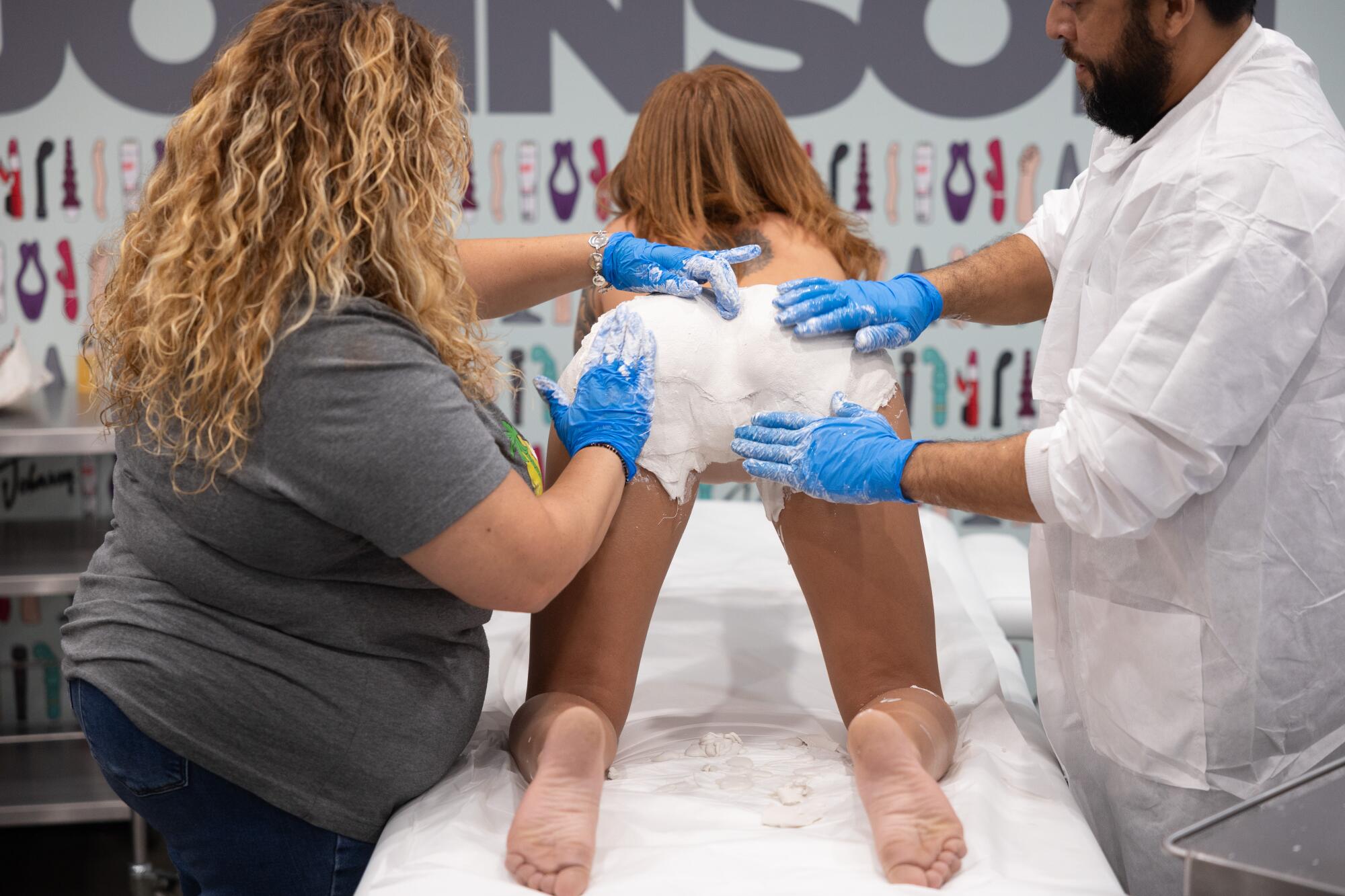
It’s a molding morning at sex toy manufacturer Doc Johnson, and adult performer Lumi Ray has arrived right on time to have anatomically precise impressions taken of her genitalia and mouth. The plaster casts will be used to make penetrable pleasure products that the company will sell under its Main Squeeze and Signature Stroker brands.
Things should go quickly today, unlike sessions when male performers get molded. Those are hard, Chief Operating Officer Chad Braverman says, because the men are usually not.
“With the guys, when they come here it’s like, ‘Put your penis in this tube and we’re gonna pour an alginate on top and it’s gotta set for five minutes,’” he says. “No stimulation at all, a wet-liquid feeling going on — it’s not that easy.”
The molding room is small and bright, with a silver cast of a woman’s breasts and torso mounted near the door and one wall covered in Doc Johnson-branded wallpaper, a cheerful mint-green repeating print of illustrated dildos, vibrators and anal plugs.

Adult performer Lumi Ray poses for photos that will be used on the packaging of her upcoming Doc Johnson pleasure products. (Myung J. Chun / Los Angeles Times)
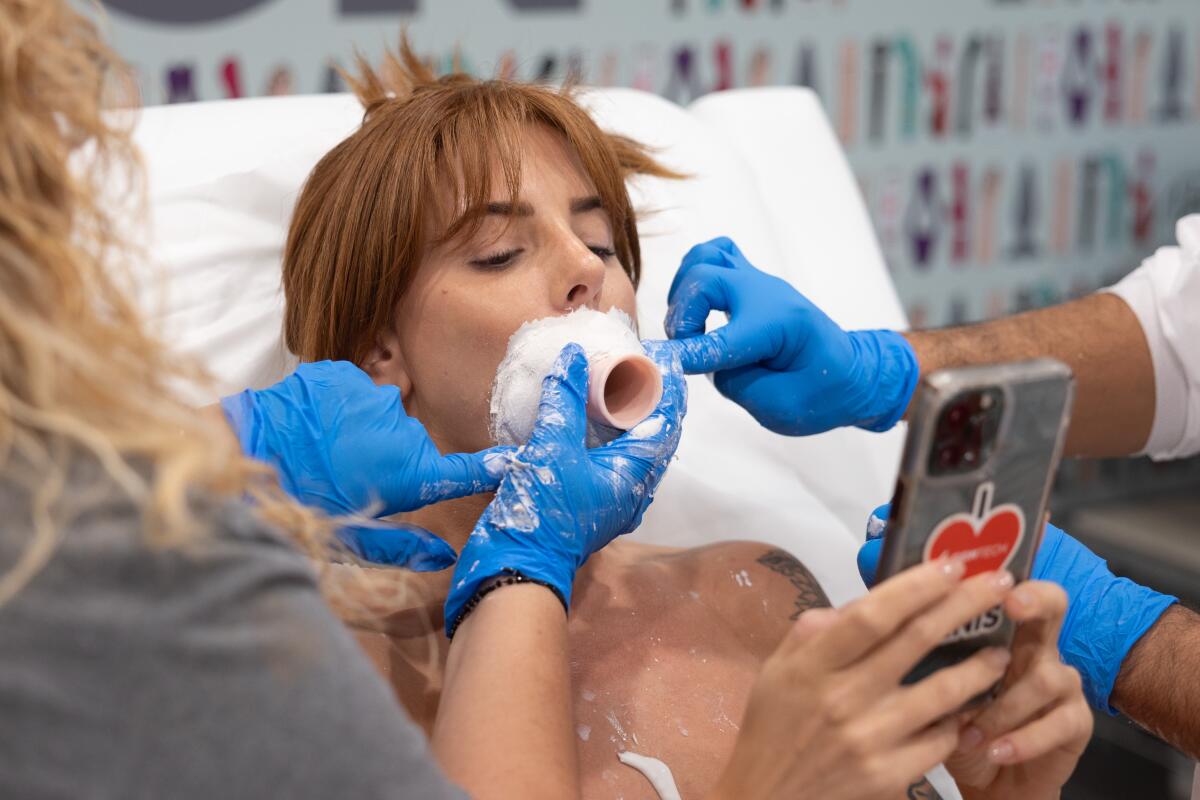
Ray takes selfies for her social media accounts while getting a plaster mold made of her open mouth. (Myung J. Chun / Los Angeles Times)
Ray enters wearing a cropped white T-shirt with the words “Your boyfriend stalks my Instagram” stretched taut across her chest. She slips into a bathrobe and helps herself to a bag of barbecue chips while two Doc Johnson employees add warm water to a seaweed-based powder compound; the mixture soon solidifies into a light gray sludge the consistency of Silly Putty.
A year and a half ago, the petite 26-year-old was working as a line cook in Napa when she joined OnlyFans. Within the first 12 hours, Ray (real name Lumina Adams) made more money posting sexually explicit content of herself on the platform than she did in a typical week of restaurant work. She quit her job and moved to Los Angeles, where she runs her OnlyFans account for 5,000 paying subscribers and stars in adult films.
Ray is an up-and-comer with a fast-growing base of followers — an appealing prospect for Doc Johnson, which has been making more performer-specific products in recent years and moved quickly to get her under contract.
As the country’s largest manufacturer of sex toys, the North Hollywood company produces an astonishing number of generic masturbators — that’s the industry term — every day, but being able to sell exclusive replicas of popular porn stars’ body parts gives it a leg up in a $32.7-billion global market overloaded with nondescript rubber dildos and vaginas.
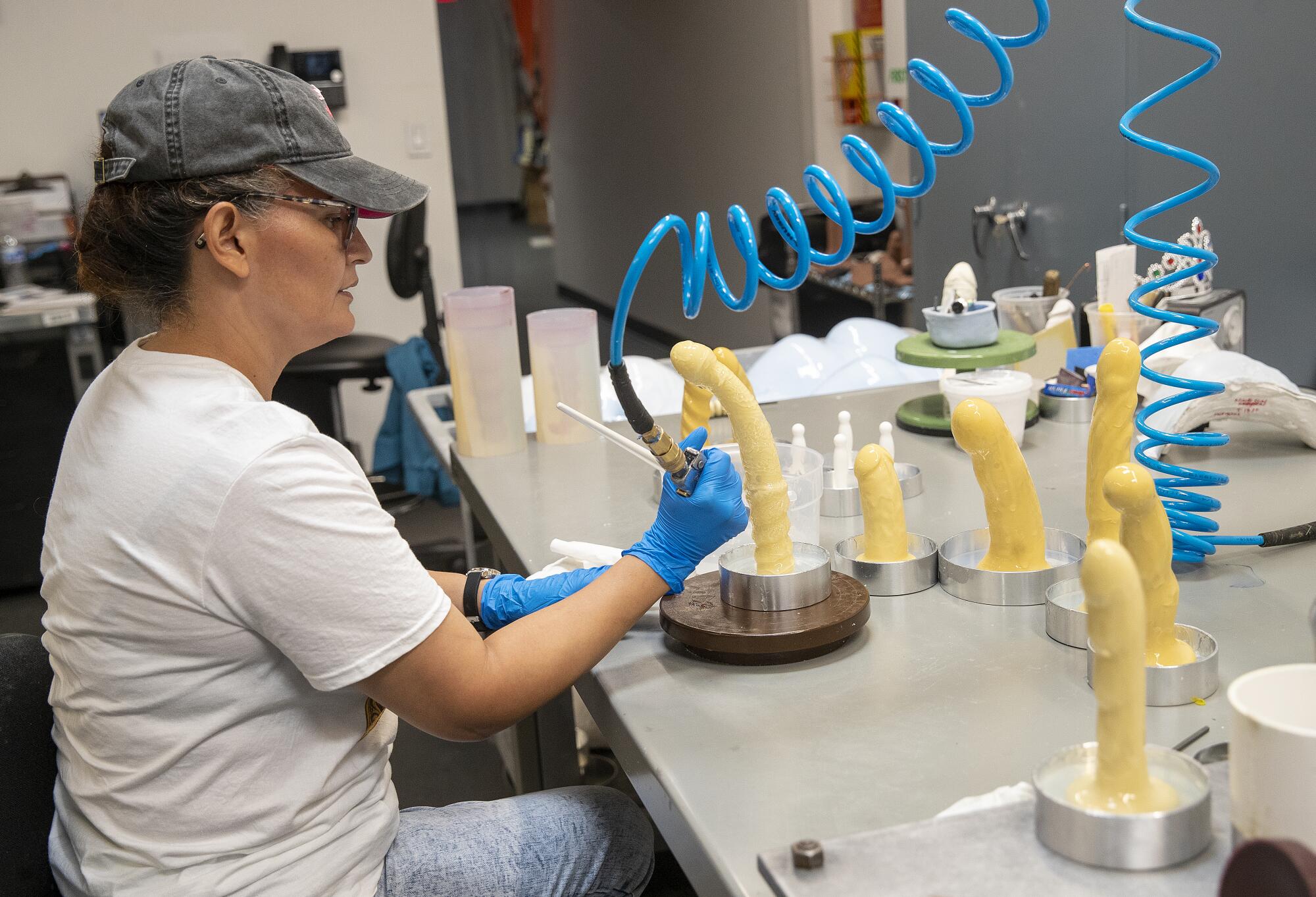
Ray is eager to be immortalized in this way. “It connects with fans on a different level,” she says before disrobing, hopping onto a fully reclined padded chair and spreading her legs. Right now people can meet her at adult expos, but for the most part, interactions are “just virtual.”
“This — I feel like they can have a part of me,” she says a few minutes later, having repositioned onto all fours as the molders slather thick goo onto her peach-perfect butt.
Ray snaps selfies and films herself throughout the process. Before she’s off the chair, she has already posted the suggestive content to her Instagram and X followers: “Yeehaw! Coming soon to Doc Johnson: MY HOLES.”
(Sean Dong/For The Times)
Ron Braverman, who is Chad’s father and the company’s chief executive, founded Doc Johnson Enterprises in 1976. The sexual revolution was well underway, but America remained prudish compared with the free-spirited culture he saw during his four years living in London and Amsterdam, where he ran bookstores that sold adult magazines and novelties.
In the U.S., he says, sex toys were commonly called “marital aids” and sold under the counter in discreet poly bags, usually to men who shopped alone.
“People didn’t discuss out in the open about their sex lives and what they preferred or what they enjoyed or the product that they bought last week,” Braverman says during a recent interview in Doc Johnson’s conference room, four boxes of thermoreactive memory-silicone dildos in assorted aspirational lengths on the table in front of him.
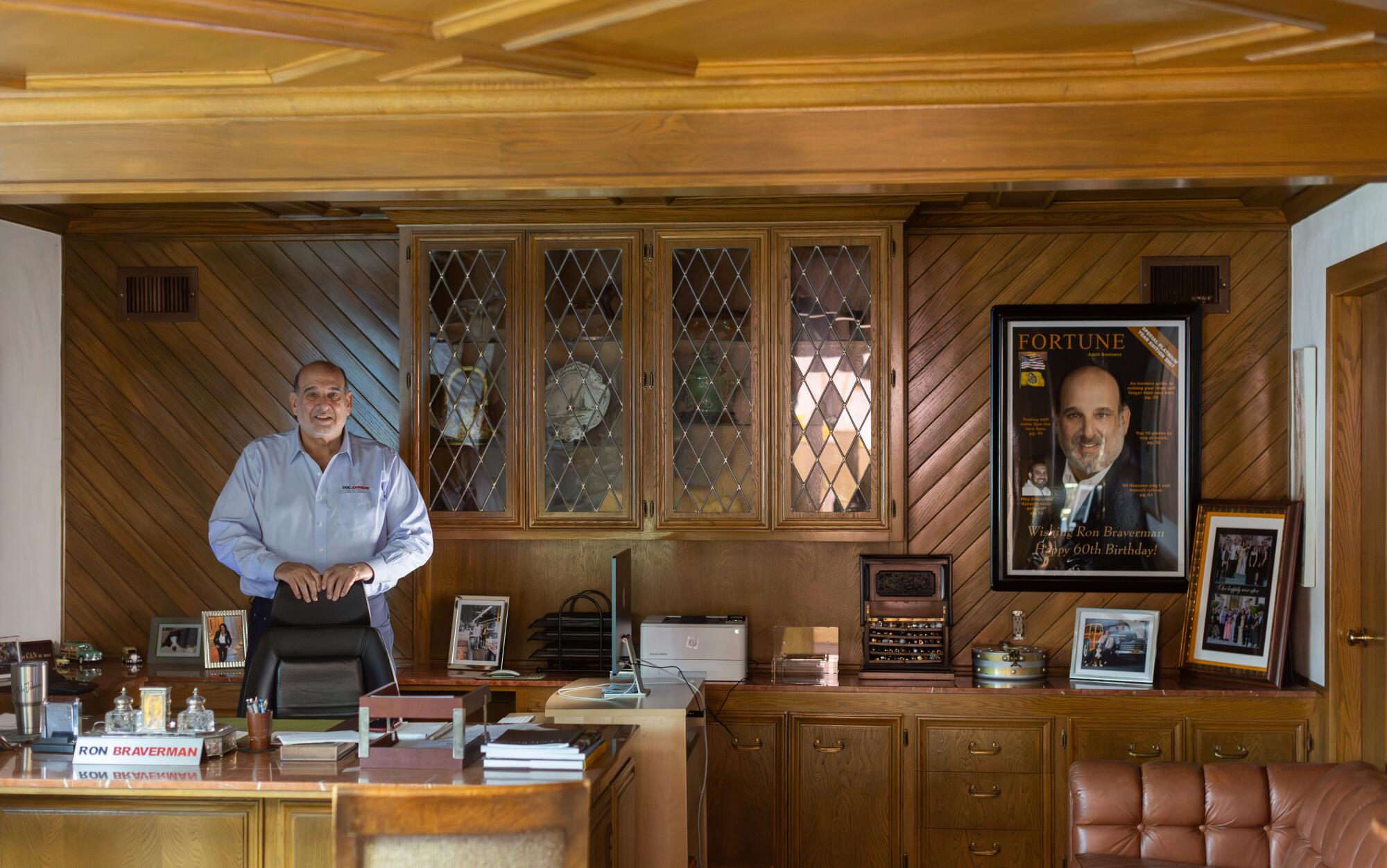
Braverman purchased a small rubber company called Marche Manufacturing that made sex toys (“nothing that would rock your world,” he says) as well as, curiously, fishing lures and Halloween special effects kits. He immediately did away with the non-erotic stuff, but the decision wasn’t about being “titillating or more taboo,” he says.
“I just wanted this business to become more of a mainstream business in America,” he says. “I felt that it was important for people to have the freedom of choice. And if this is something you wanted, fine; if it was something you didn’t want, fine.”
He called his company Doc Johnson: “Doc” to give it credibility, he says, and “Johnson” because it’s a common last name — “It had nothing to do with the euphemism for the word Johnson.”
Damon Lawner founded the exclusive sex club Snctm, then sold it for $1 million. At his naughty new WeHo restaurant, $10,000 gets you a booth with a velvet curtain — and no prying eyes.
To destigmatize the shopping experience, he packaged Doc Johnson merchandise in clear boxes for open display on store walls. The products themselves were also upgraded to look and feel more realistic. Marche’s dildos had visible seams running down the shafts, an unsightly result of using two-piece plaster molds; Braverman replaced them with one-piece copper molds, which made the pieces smooth all over. Switching to higher-quality rubber meant better squeezability and, in the fake vaginas, a better fit. And he added more colors, more sizes, more shapes to everything.
Business boomed in the 1980s and Doc Johnson’s catalog continued to swell, reaching 2,200 unique items by the late 1990s.
There was the Original Pocket Rocket, a small external-use bullet vibrator; the John Holmes Personal Pump, a plunger-style enlargement device endorsed by the well-endowed porn star; the Vac-U-Lock harness-and-attachments system; and all manner of dongs, strap-ons, C rings, life-size dolls, ticklers, anal beads, massagers, lubricants, penis extenders and bondage restraints that were sold in sex shops around the world.
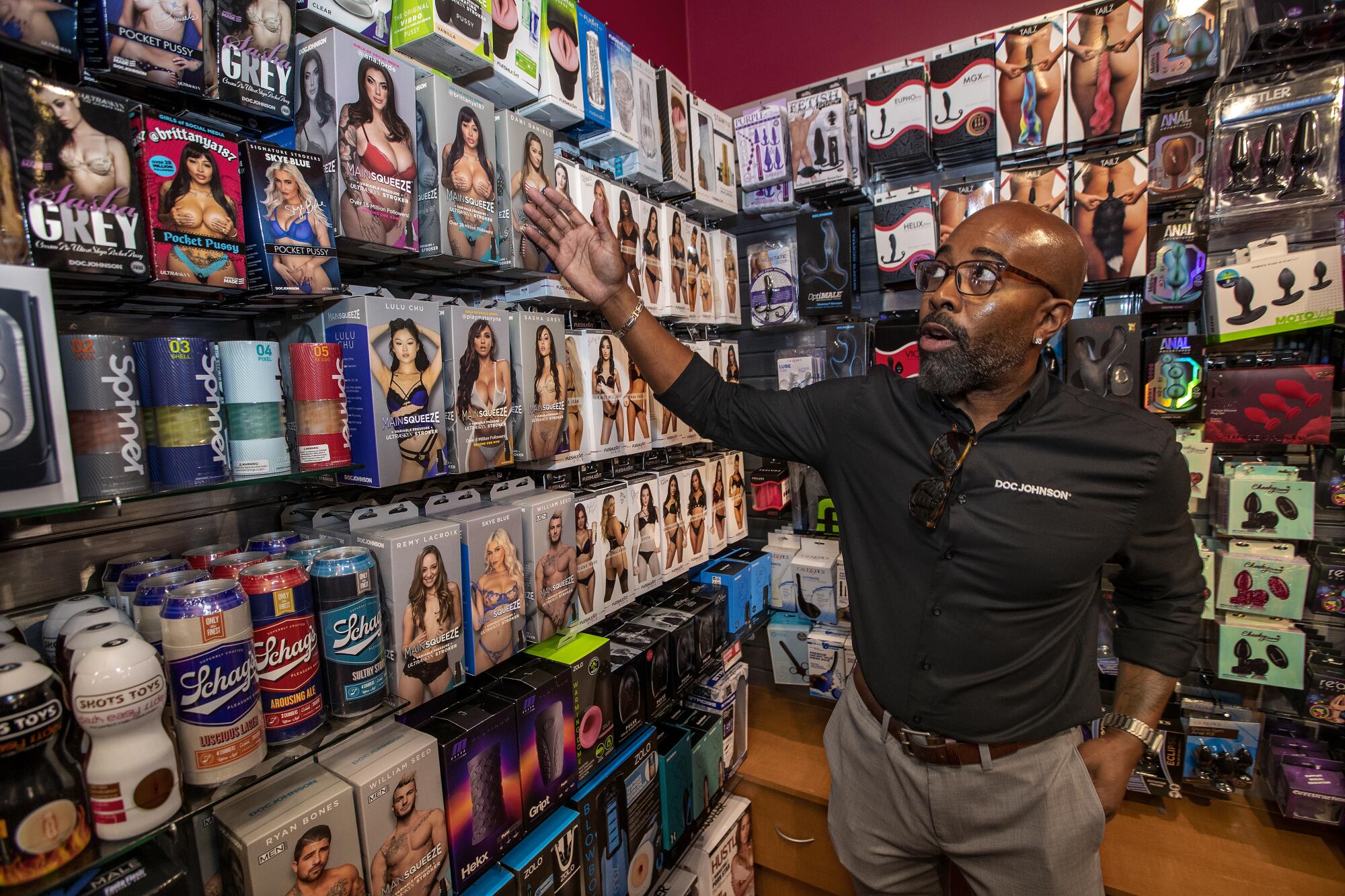
All of it was manufactured in North Hollywood except for electronic items, which were produced in China, and what began as a small 1,500-square-foot operation grew to a 250,000-square-foot compound that in 2015 employed 575 people and churned out as many as 20,000 items a day.
Braverman was fiercely proud of the Made in America emblem, touting it on Doc Johnson packaging and on red, white and blue signs around headquarters, and of the company’s workforce, the vast majority of whom were female and Latino.
In 2004, Chad Braverman officially joined Doc Johnson after graduating from the University of Miami with a business management degree. By then sex toys had become widely accepted — thanks to pop culture moments like a 1998 “Sex and the City” episode involving a vibrator called the Rabbit — and ubiquitous, just as his father had dreamed. The concept of sexual wellness as an important part of overall health was taking root, signaling potentially even greater numbers of customers in the coming years.
But the costs of manufacturing in the U.S. had soared and the pleasure products landscape was crowded with new companies that imported the bulk of their goods from overseas and sold them for cheap.
It was becoming clear, Chad told his dad, that the tried-and-true formula that had propelled Doc Johnson to No. 1 would soon become outdated and unsustainable. In 2017, he began taking over day-to-day operations.
“My role these days is pretty much: I come in as the old guard,” says Braverman, who at 76 is still burly and brashly flirtatious. He has no plans to retire and arrives at the office by 6:30 a.m. every day, sitting in on sales and marketing meetings but leaving the big decisions to Chad. “I’m the O O O O G.”
Chad Braverman was born six years after Doc Johnson was founded and spent his early childhood in Sherman Oaks not knowing exactly what it was his father did for a living. “Mafia activities” was his best guess.
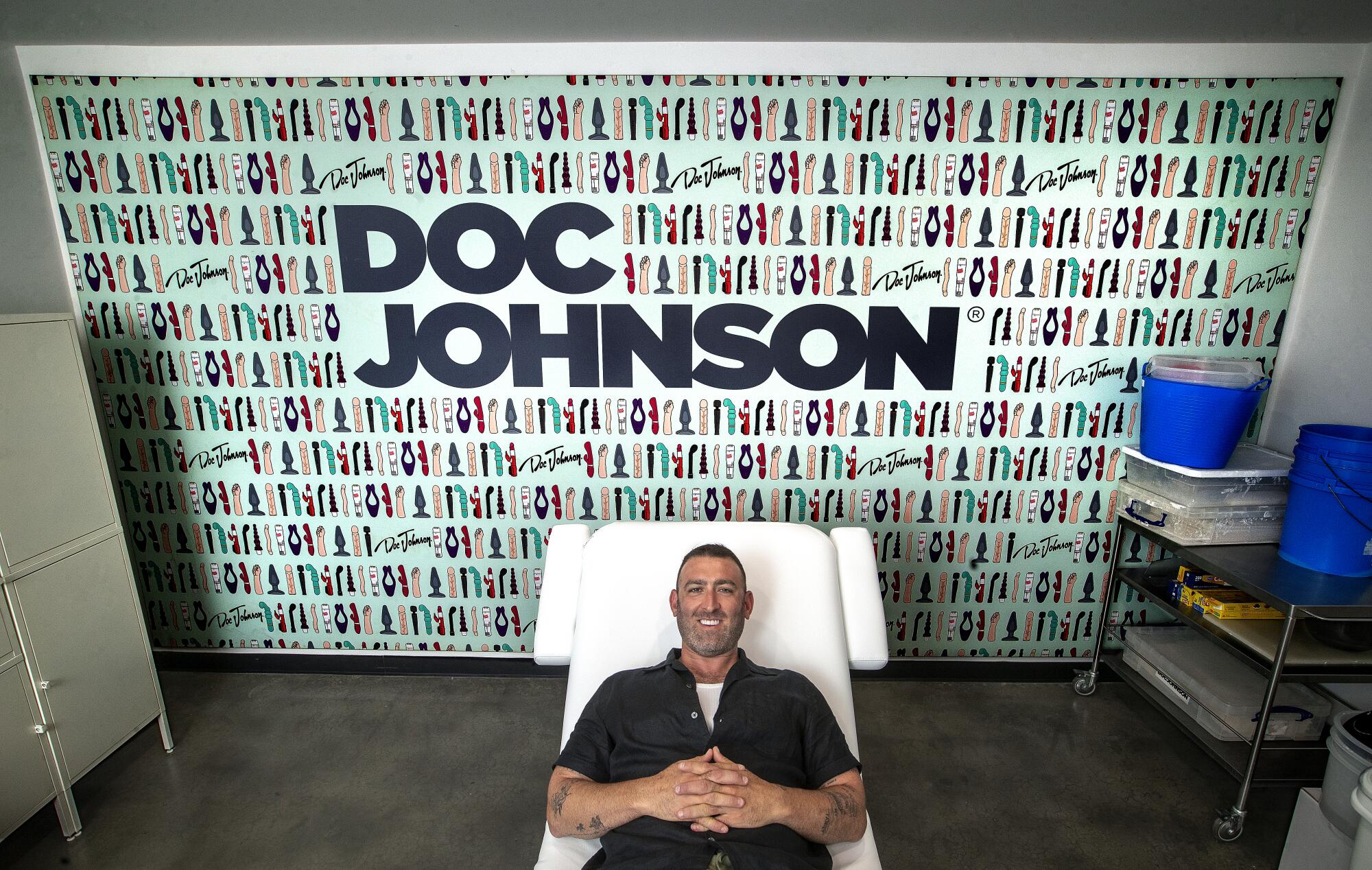
In eighth grade, he started helping out around the factory and warehouse, making his way through pretty much every department — front office, production, finishing, purchasing, shipping and the lotions and lubes lab — as he grew up.
Still, he knew taking on a full-time executive role would mean immense pressure to prove himself and “a lot of fighting against the current.”
“Working in a family business for your parent, you are going to be a nepo baby,” he says during a tour of the compound one afternoon, passing by an artist carefully adding veins to a clay dildo prototype using a magnifying glass and a tiny brush. “I’d be a liar if I said it doesn’t bother me when someone only knows me as the son of the owner.”
He’s lived his Doc Johnson life for 50 years, and I’m trying to live mine for 50 years.
— Chad Braverman on his father, Doc Johnson founder Ron Braverman
To downplay the relationship, he began calling his dad “Ron” in front of colleagues and clients. And he unapologetically forged his own way when he took the reins — besides COO, he is also chief creative officer — reevaluating the business from top to bottom as Doc Johnson entered its fifth decade.
Seven hundred individual items were eliminated for being unprofitable, too expensive to produce or inconsistent with the brand. Packaging was redesigned to be more aesthetically pleasing and less in your face. The workforce skewed ever-younger, and a social media team was assembled to get the products in front of millennial and Gen Z consumers.
The company increased its private-label business, making products for smaller sex toy sellers that don’t have their own manufacturing capabilities. Third-party contract work is now the fastest-growing division of Doc Johnson, growing 200% in the last decade and now accounting for a quarter of revenue.
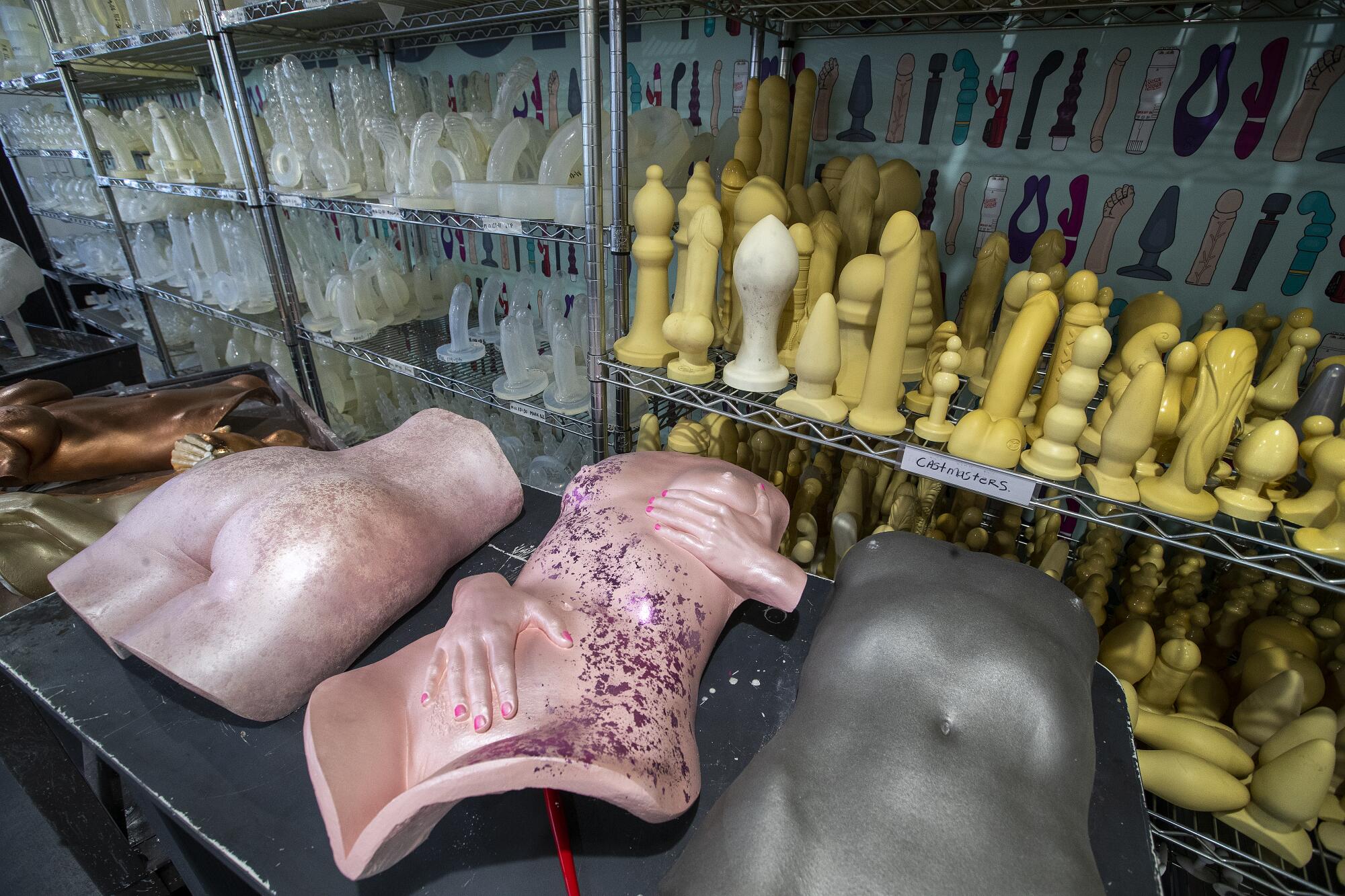
Its molding program, which Braverman had started in the late 1970s, also expanded, and an aggressive push was made to recruit top adult performers and celebrities. In 2018, when Braverman learned that rapper and reality star Safaree had agreed to have his penis molded and sold as a “12-inch Anaconda,” a nod to ex-girlfriend Nicki Minaj, he asked the team why his company was getting into the internet business.
“They use a lot of words I don’t understand,” says Braverman, who thought they meant the Safari browser.
The sharpest pivot in the company’s history came when Chad, 41, proposed moving manufacturing to Mexico to save money.
“Ron probably would have stayed the course,” he says. “I don’t mean this in a bad way, but I don’t think he sees long-picture anymore. In general I think he’s lived his Doc Johnson life for 50 years, and I’m trying to live mine for 50 years.”
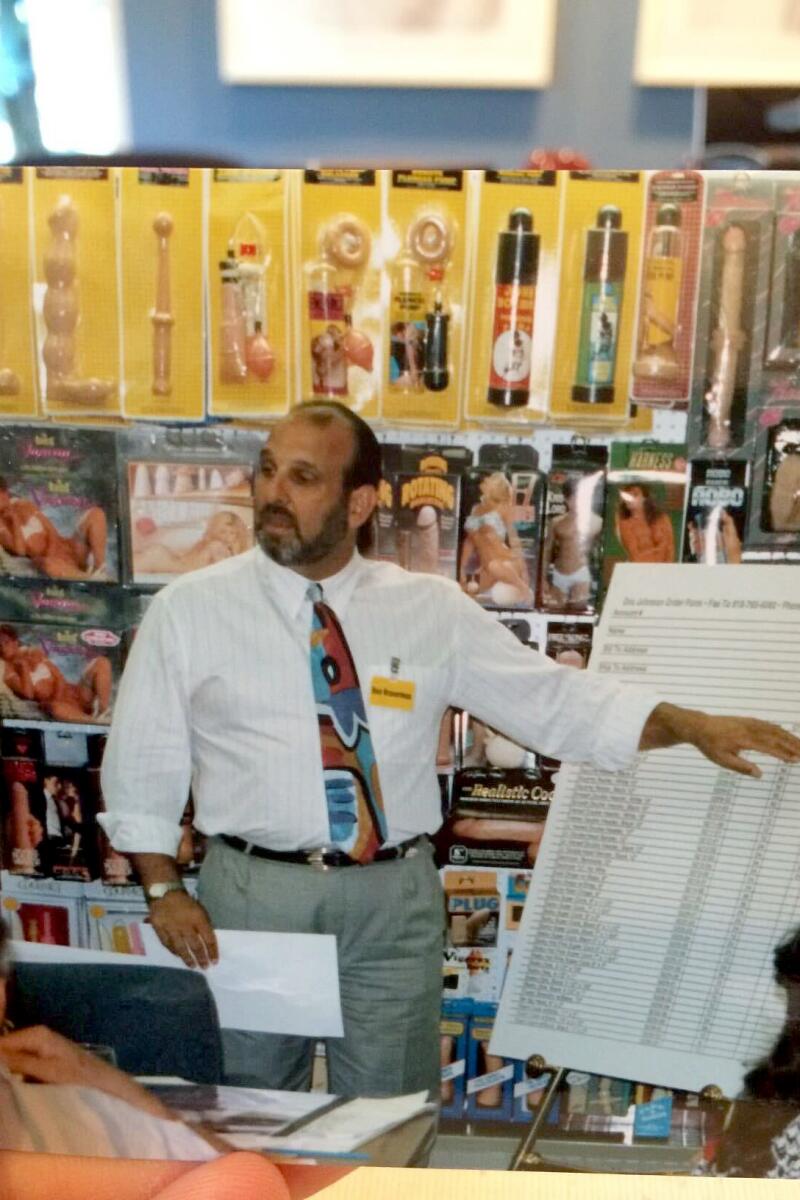
Doc Johnson founder Ron Braverman leads a meeting at company headquarters in North Hollywood in the 1990s. (Family Photo)
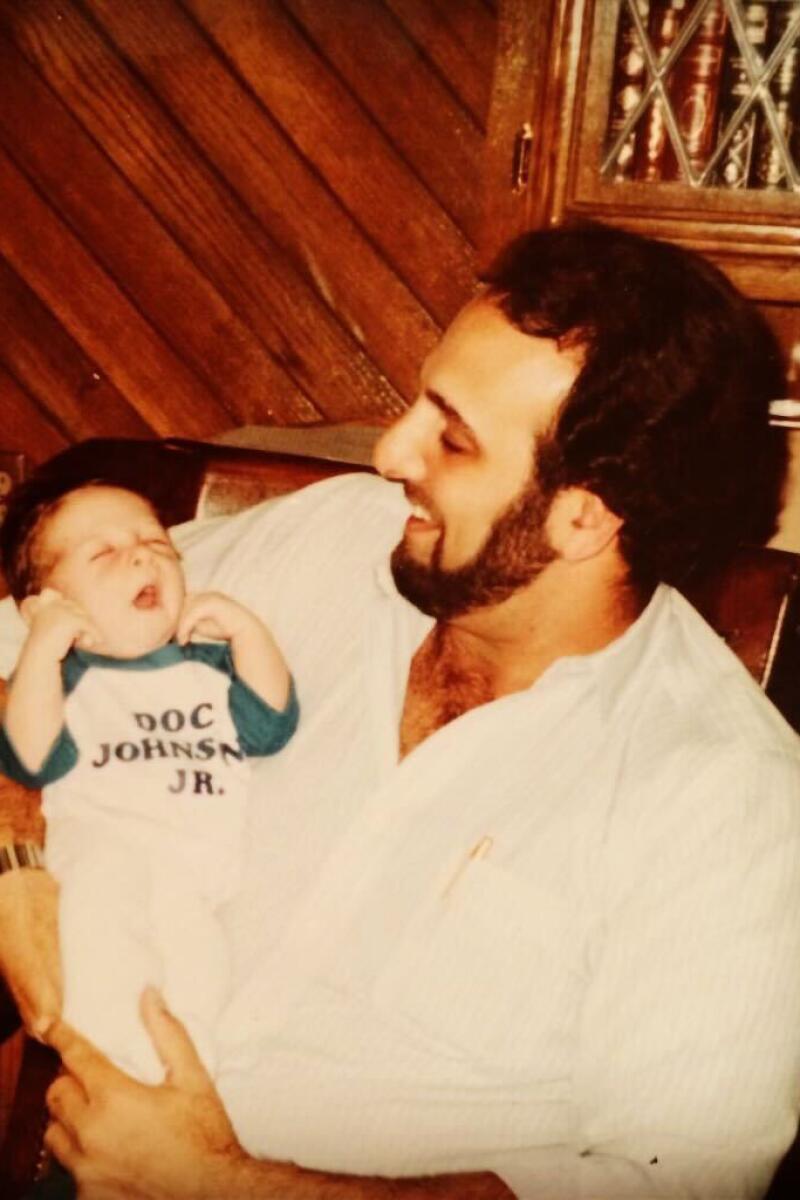
Ron Braverman holds his son, Chad, in his office at Doc Johnson in the early 1980s. Chad now runs the sex toy empire his dad built. (Family Photo)
Six years ago, Doc Johnson signed a lease for a factory in Mexicali and gradually shifted 75% of its manufacturing south of the border, a process that concluded this summer. It laid off most of its North Hollywood staff as a result, leaving fewer than 150 employees at headquarters, where the art department, molding, marketing, shipping and lab remain.
He started making peppermint castile soap in his Pershing Square tenement in 1948. Here’s the very California story of the man, the cultish product and the progressive company.
Abandoning the locally made ethos was crushing for Braverman. He has visited the Mexico facility only once with his son, who makes the four-hour drive every other month to check on operations. He avoids walking the old factory floor, a cavernous concrete building on an industrial side street that now sits quiet, empty of machinery and workers. A 15-foot banner that says “American Made Pleasure Products” still hangs from the ceiling.
“These were people that worked their ass off every day,” he says. “I have trouble going back there now. Because there’s nothing there, and it was never that way.”
Chad says the move required a “gigantic outlay of cash,” but he expects it will eventually result in a roughly 50% reduction in costs. He and his father are the sole owners of Doc Johnson, with no outside investors.
The company brings in about $300 million in annual retail revenue, which excludes its third-party manufacturing contracts, and total sales have grown despite doing away with so many products (it now makes up to 12,000 pieces a day), Chad says.
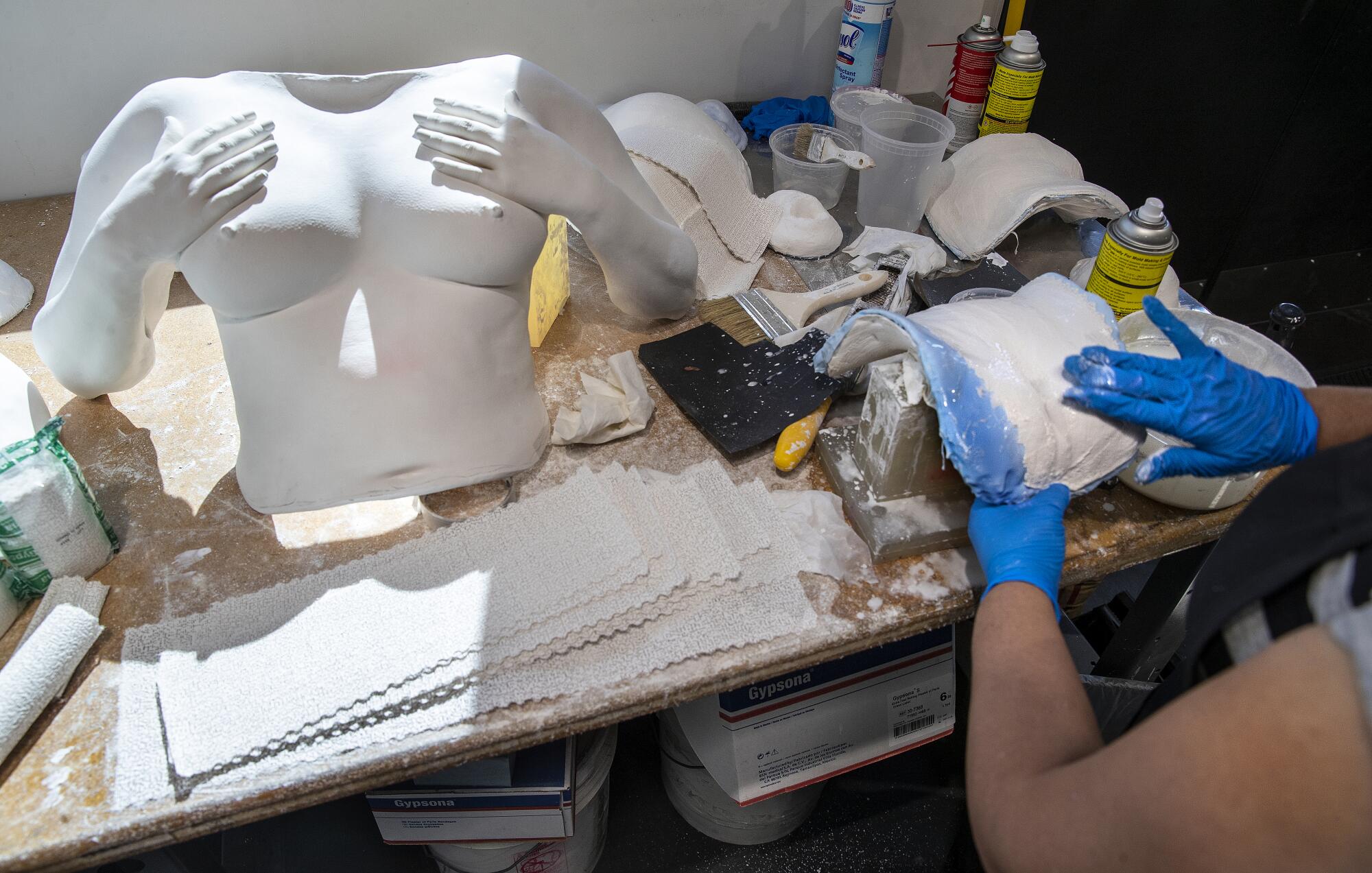
Like it was for many sex toy companies, 2020 was by far the best year in its history as people quarantined at home, bored and with little else to do. The company saw revenue double that year, but things have slowed considerably since, particularly for premium products priced at $150 or higher.
No single Doc Johnson product accounts for more than 1% of revenue, an extremely diversified merchandise lineup. Chad believes there’s still a “grand slam product” yet to be invented, and he has been exploring ways to embed AI into adult dolls and technology that could provide “a whole new way to deliver vibration.”
The company is also broadening its purview beyond pleasure. Starting in a few weeks, Doc Johnson wall displays at sex shops around the country will carry tests for pregnancy, ovulation and drugs including fentanyl, as well as an over-the-counter female contraception similar to Plan B. Last month, Doc Johnson inked deals with two cannabis companies to add edibles, joints and medicinal mushrooms to its distribution catalog. Someday, Chad would like to open a Doc Johnson retail store.
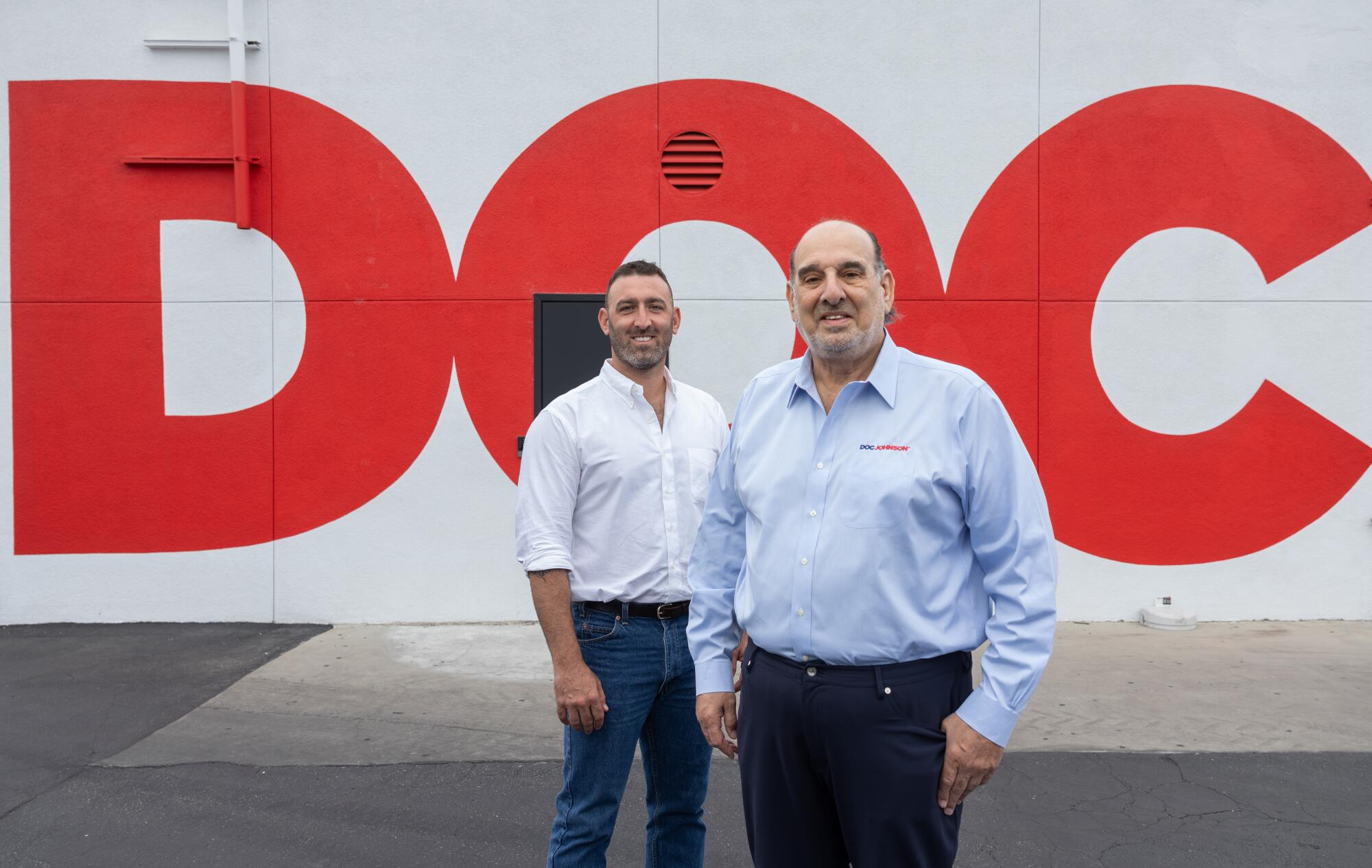
He has his father’s support on all of it, although Braverman’s pride for the second generation of Doc Johnson is tinged with wistfulness for what used to be.
“But that’s days of yore and you have to be honest about it,” he says. “What Chad has brought to this company is the younger vision.”
More to Read
Subscriber Exclusive Alert
If you're an L.A. Times subscriber, you can sign up to get alerts about early or entirely exclusive content.
You may occasionally receive promotional content from the Los Angeles Times.
















